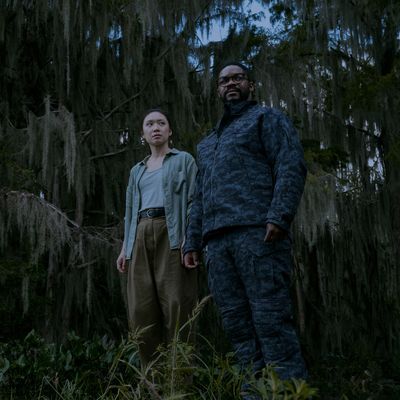
What does resolution look like in a series like 3 Body Problem? This is a show structured around an alien invasion that won’t occur for another 400 years; it’s an exercise in delayed gratification, and this season finale doesn’t exactly offer closure. That’s not to say that there are too many dangling mysteries at this point besides the San-Ti’s physical appearance. This first season has done a pretty good job answering the main questions from those first couple of episodes. The ambiguities that remain are bigger and broader.
The real main character of “Wallfacer” is actually Saul, who’s being set up for a much more crucial role down the line. At the beginning of the episode, his one-night stand is taking him to task for forgetting her name. This whole season, he’s been the most passive character, filling the void with drugs and casual sex, and this feels like a sort of rock bottom. Saul pretends there’s something freeing and joyful about completely ignoring the distant future and just enjoying the time we have here on Earth, but there’s something fundamentally selfish and juvenile about that attitude. Besides, it’s obvious that Saul doesn’t actually feel liberated by his nihilism. He’s grieving multiple friends and a mentor, and it feels like, deep down, he craves a shock to the system.
That shock arrives quickly during an argument on the walk to his date’s Uber. The hacked self-driving car that comes out of nowhere and kills Nora was meant to kill Saul, and there’s reason to think more attacks might follow. Clarence confirms to him that Ye Wenjie was murdered in China, along with the agent he sent to follow her. Mike Evans and his colony may be gone, but there are lots of other alien worshippers ready to take their place.
I was a bit surprised at first that Saul and Clarence haven’t actually met before now, but it makes sense — Saul hasn’t actually been involved in much this season besides spending time with Will in his final weeks. But the two make for a fun pair, with Saul’s moroseness and utter bafflement bringing out a lighter, more playful side in Clarence. His job now is to keep Saul safe, beginning with their trip to New York City for a meeting of the new Planetary Defense Council.
Secretary General Lilian Joseph (CCH Pounder) explains the gist of the new Wallflower program: Since the Sophons’ constant surveillance makes it impossible to do or say anything without the San-Ti being aware of it, the PDC is selecting three people to independently develop plans that they won’t share with anyone else until it’s time to execute them. The first two Wallfacers are a Chinese general named Hou Bolin and a Kurdish war hero named Leyla Ariç. The third is Oxford’s favorite stoner physicist. When you need a Wallfacer, better call Saul!
Nobody will explain to Saul why a glorified lab assistant (albeit a brilliant one) was chosen for this role, of course, for the same reason Wallfacers exist in the first place: The San-Ti are listening to everything, and there’s no real way to openly (or even discreetly) communicate without them picking it up. Saul sticks to his refusal, storming out of the building without looking back, but he doesn’t make it far before he’s shot by an unrepenting sniper who later identifies himself as “a soldier in the army of the Lord.”
Some of this stuff is a bit drawn out and repetitive, with multiple cycles of Saul rejecting his new post and failing to get any answers. But his second conversation with the secretary general is more compelling than the first, with Joseph suggesting that people (and the San-Ti) might still believe he’s a Wallfacer even though he rejected the role very publicly. When Saul suggests people should all just relax and smoke a joint since they won’t be around centuries from now anyway, it feels like a last gasp of the philosophy that has kept him stagnant throughout this season.
Saul has never been one of the true main characters of this series, but his arc actually feels pretty coherent, even if he stayed static for most of the season. In some ways, he’s a mouthpiece for a particular set of philosophies, similar to Auggie. While she’s defined by moral righteousness — opposed to war and only interested in science insofar as it can help people around the world — Saul is defined by the inertia that comes with believing it’s all a waste of time to fixate so much on an imaginary future generation. (Symbolically, he’s somebody who needs to be convinced to care about climate change.) His arc is about learning to step up and dedicate himself to something important, even if he didn’t choose that path.
Jin is having an even worse few days than Saul, racked with stress in the immediate lead-up to the execution of the Staircase Project. She pretends it’s all about making sure the launch at Cape Canaveral goes well, but it’s obviously deeper than that, and Raj knows her well enough to diagnose the real source of the recent distance between them. Jin loves Will, present tense. She even asked Wade to include small samples of corn, wheat, and chili pepper seeds in the capsule (Will likes spicy food) — a request that Wade initially rejects before eventually caving. Maybe the cold bastard has a heart after all.
I actually feel more for Raj than I expected during this breakup. Jin doesn’t really expand on the depth of her feelings for Will, but she also completely disregards how Raj feels. Yes, the guy is a dork who doesn’t seem to struggle at all with his complicity in a massacre, and he doesn’t have Will’s yearning puppy-dog eyes, nor did he spend millions of dollars on a star for his girlfriend. But he at least deserves a real conversation, and Jin hardly grants him that. Even later, during the launch, she just gives him the cold shoulder, perhaps disgusted by his lack of faith that the San-Ti would consider rebuilding Will.
It turns out Raj is both right and wrong. Wrong because the San-Ti actually were open to meeting Will, based on Sophon’s words to Wade — but right because, in the end, they never will. After the probe launches, one of the early nuclear detonations snaps one of the lines to Auggie’s radiation sail, causing the probe to veer completely and irreversibly off course. Will won’t even float past another star for 6,000 years.
It was always a long shot that everything would work out exactly the way it should in this untested, wildly risky maneuver, so this is just the most realistic, anti-climactic result. Still, I have to admire the darkness of this turn. I figured something would go wrong — the whole sequence reminded me of a For All Mankind finale — but it’s pretty bold to end on such a monumental, trillion-dollar failure.
So we’re left with these two dejected, disillusioned scientists at a motel pool in Florida, with Clarence as an unexpected source of pragmatic optimism. After all, he points out, Jin’s probe might’ve failed, but it was still a groundbreaking scientific achievement. And humans may be bugs, but bugs are resilient. At a marsh buzzing with cicadas, all three of them can see that. That image is a simple, powerful conclusion to 3 Body Problem’s central metaphor: People have always tried to get rid of bugs, but they’ve always failed. This war is far from over. In fact, it hasn’t even begun. Better get back to work — the future is getting closer every minute.
Subatomic Particles
• We get a short glimpse of Auggie in San Luis Potosi, Mexico, demonstrating to a group of villagers how to fit her nanofiber filters to prevent another dysentery epidemic.
• The version of Clarence Shi in this episode feels a little more consistently funny and idiosyncratic, more like the Da Shi I remember from the book. Very glad we got to see the show’s take on the locust scene.
• So why do we think Saul was chosen as Wallfacer? His last conversation with Wenjie feels significant.
• Tatiana gets a helmet with the note: “If one of us survives, we all survive.” Any guesses what the San-Ti are up to this time?
• Wade is always very firm in his plans, but that encounter with the San-Ti (via Sophon) on the plane near the end might be the first time he looks legitimately shaken. It’s both a diplomatic meeting — they’d like to meet him one day and assure him he has a place in their plan — and a serious threat. How do you fight somebody who can control every aspect of the way you perceive the world around you?
• It seems like Saul also comes around to recognize the relationships that matter in his life — particularly with Auggie, though she doesn’t accept his call. I never really knew what to make of this pairing besides enjoying the “beautiful in a boring way” scene, but I guess they love each other and won’t admit it?
• I have no idea what a second season of this show would look like, but I’m looking forward to hopefully finding out eventually, despite the problems I had with this adaptation. Until then, thanks for reading!


